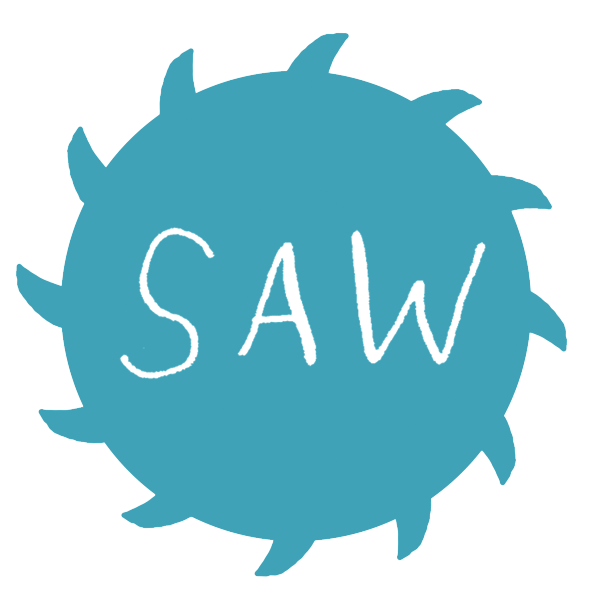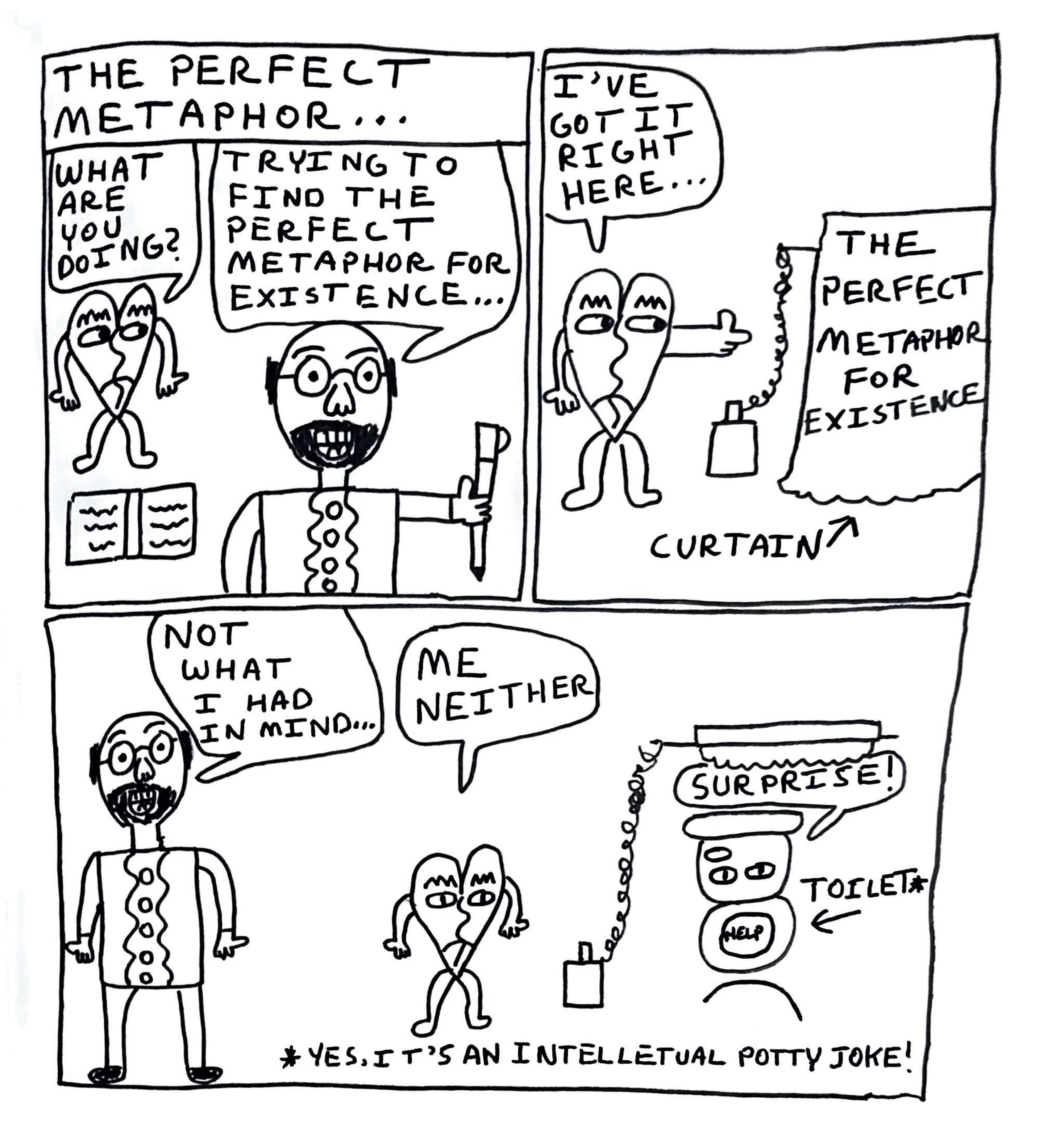Interview with Dusty McGowan
SAW spoke with YLP Alum and FLOW + Publish member Dusty McGowan about his experiences with comics, his creative process, and his unique perspective as a psychotherapist cartoonist.
Dusty was also a guest on the most recent episode of SAW’s Comics Karma podcast with hosts Tom Hart and Lauren Weinstein. Check out the episode!
Interviewer: How and when did you get involved with comics?
Dusty: I feel like my comics creation career started almost by accident. I was stuck at home during the Pandemic (just like everyone else). During that time, I started to think about very broad philosophical ideas that I had never quite been able to tackle with “regular” writing. My background is in prose and screenwriting; basically very functional storytelling that doesn’t always let your imagination stretch out. Because I had over a year to stare at my own navel (remember, the pandemic), I wondered if visual art was a possibility to start to tackle “the big questions.” Why are we here? What is this life of ours all about? I’m still wondering if what I do can even quite be called “cartooning,” or it is something else?
Were you interested in comics as a kid?
I’ve thought about this a lot since I started drawing comics. The two things I remember obsessing over that do constitute as “comics” were Mad Magazine and the political cartoons in my mom’s Newsweek. However, I do remember getting a copy of the Batman comic The Killing Joke and being greatly disturbed. I also read the Sunday Funnies almost religiously. I also remember having several collections of The Far Side.
What is your all time-favorite comic or long-form graphic book or comics series? What do you love about it?
I remember the film American Splendor introduced me to the work of Harvey Pekar (and the various artists who illustrated for him). Harvey Pekar himself said that (apologies if I am misquoting): “ordinary life is pretty complex stuff.” I was really inspired by how he found the profundity in the mundane.
I also feel like I owe Lynda Barry a debt of gratitude. I had a therapist who introduced me to her book One Hundred Demons and that planted the seed for handling personal trauma in a humorous, accessible way. I also really love her Marly stories; basically short stories written in four panels or less.
Tell me about some important teachers, artists, courses, or schools that have influenced your work.
I was a near constant reader from a very early age. I remember coming across my Dad’s old Kurt Vonnegut paperbacks, which were my introduction to finding the humor in tragedy (especially Breakfast of Champions). I was incredibly fortunate to have a mentor named Digby Wolfe (the co-creator of Laugh-In). Digby heavily encouraged me to find the humor in my own situation (and the world around me). I have his voice in his head to this day. I know that R. Crumb can be a polarizing figure. However, his visual aesthetic continues to influence me and his utter disregard for portraying himself as “likable.” I would also be negligent if I didn’t mention Ivan Brunetti; both his cartooning style and his writing about cartooning have been invaluable. Most importantly, for this space anyway, I’m very grateful for SAW and the community around it! (Even if I can never quite finish all the homework.)
Tell me about your comics style and what makes it unique.
That’s a complicated question that requires me to take pride in my work. (If you’ve seen my work, you might well wonder if I have anything to be proud of). I feel like there’s a deliberate approach that I’ve embraced. I know full well that I am not a technically gifted artist and my drawings will look somewhat simplistic. That contrasts nicely (I hope) with the fact that I’m trying to tackle “the big questions.” I don’t know of many other cartoonists who are also trained therapists. I hope that reading my comics feels like having a good friend who isn’t afraid to take your hand while you explore your own psyche (and I’m not even sure what that means, but it sounds good). To quote another one of my influences, Samuel Becket from his play Endgame: “Nothing is funnier than unhappiness.”
Tell me about your creative process. Do you have a specific process for creating comics from idea to finished pages?
I might describe my process (in clinical speak) as somewhat “crazy making.” I still consider myself primarily a writer, so I do usually draft out my ideas in written form. That is usually followed by trying to find a visual idea that will carry whatever concept I’m trying to tackle. I’ve been lucky enough to develop a rotating cast of characters that are suitable for exploring various topics (and usually know which concepts to delegate to specific members of “my family.”) One of the hallmarks of my work is that I often draw myself (and put myself at the butt of the joke more often than not). The other thing that has become absolutely vital is to create at least one finished (or at least finished-ish) cartoon a day come hell or high-water. I find that causes me to be far less precious than I ever was as a writer (one who would often get stuck in “rewrite hell” for multiple years on one project). I can no longer use the excuse of “it’s not done yet.”
What tools and supplies or apps do you use and why? Digital or Analog?
I will freely admit (as a way of setting myself free) that I’m terrified to draw digitally. I go “straight to pen,” meaning that I don’t really rough anything out or pencil it first. My weapon of choice (the pen is mightier than the sword) is the Micron 10 pen. I love the thick line quality of that (almost like a Sharpie). I always have a sketch book on me.
What projects are you working on now? Include links if you have any parts of this project online that you'd like to share.
My non-comics life right now involves trying to hash out a draft of a first novel. Honestly, most of my work is going directly to Instagram daily. (I’m too overwhelmed and/or lazy to try other platforms like Substack. Soon, though…)
What projects do you have planned for the future?
I do have plans to eventually write an autobiographical comic memoir. I would just need to find an original angle on that first. I also have a reoccurring character in my work named Baby Death (Death’s son, too smart for his own good). I would love to see him have his own graphic novel. That would be a sad coming of age tale about Baby Death realizing he doesn’t want to “grow up” to be a Grim Reaper. (That sounds utterly asinine when I saw it out loud).
Where can we see more of your work and/or purchase your comics and books?
The best place to find me is still Instagram. I have somewhat delayed putting together a first collection of my work, but I would like to see that come within the next year or so. (Though, stick to Instagram…it’s free).
Is there anything else you would like to discuss?
I’m very open to any sort of criticism or feedback that anyone has to offer. I very much consider this a craft and am excited to keep improving mine. Also, I would love to hear any ideas about how I might be best to showcase my work. Putting myself in the spotlight like this is not my chosen milieu, but here I am.






